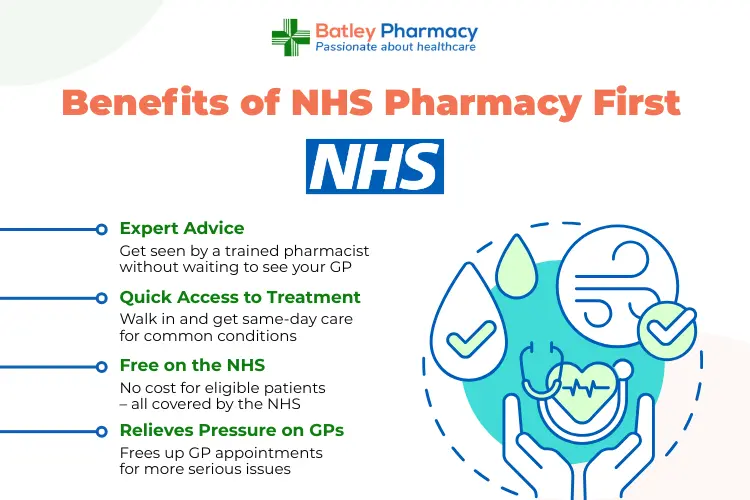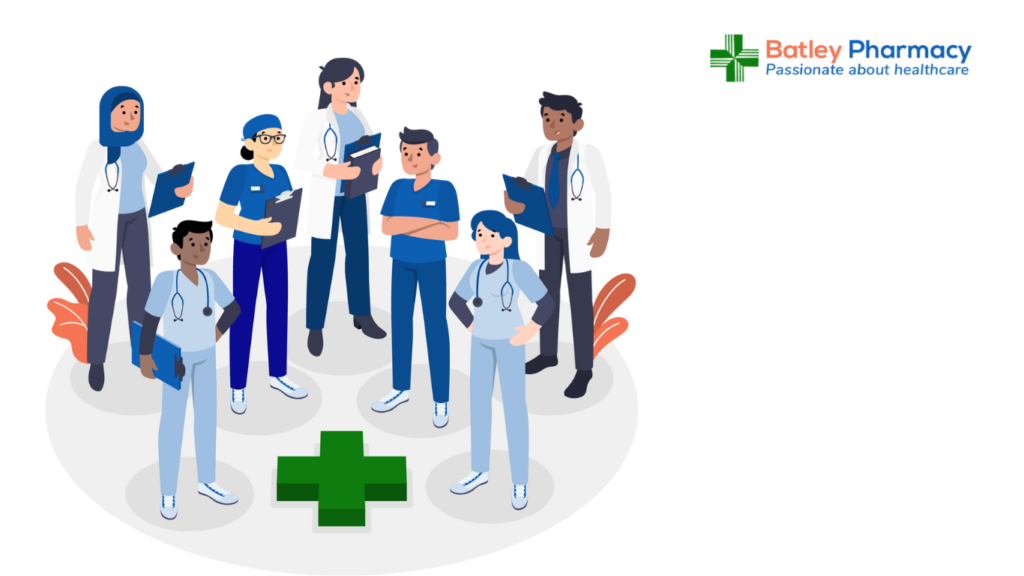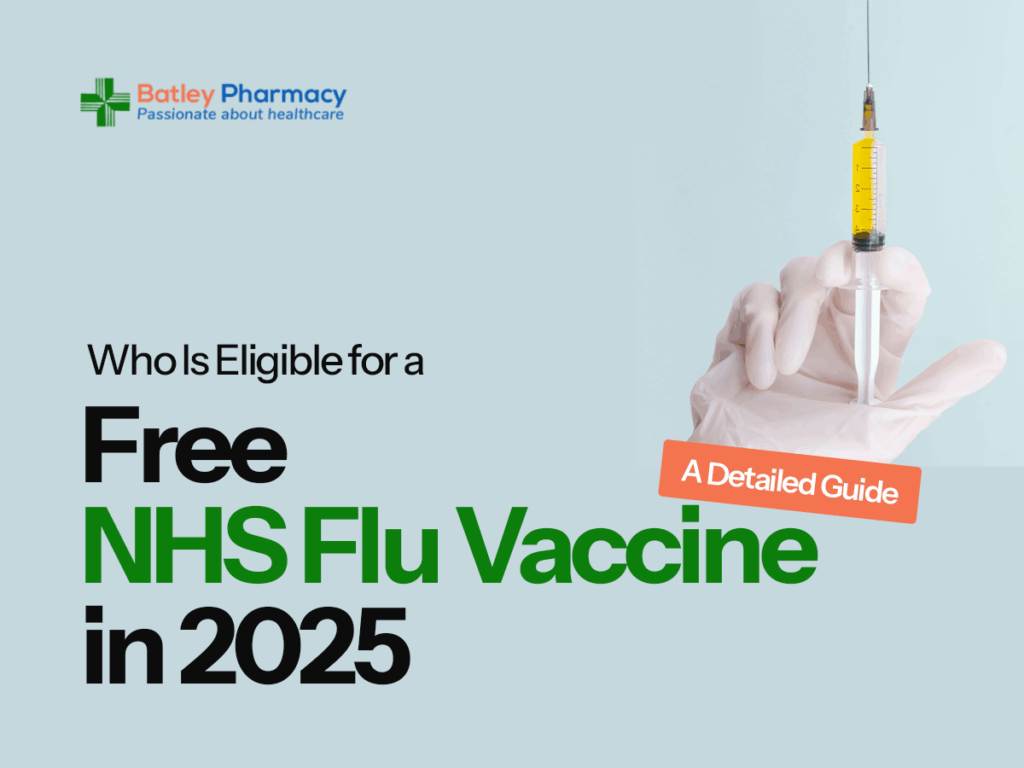Accessing treatment conveniently and quickly is essential, especially for common health conditions that do not require a GP appointment. With the NHS Pharmacy First Scheme, patients can receive expert care for a range of minor ailments without needing to visit their GP first.
This guide explores the Pharmacy First conditions most commonly treated, who is eligible and how to access this service. Whether you are short on time or unable to book a GP appointment, Pharmacy First can offer the support you need.
What is Pharmacy First and How Does it Work?
Pharmacy First is an NHS service designed to make primary care more accessible. Under this scheme, trained pharmacists conduct clinical assessments, provide expert advice and, where appropriate, supply medications without the need for a GP appointment.
This service supports minor ailments, including sore throat, earache, sinusitis, impetigo, infected insect bites, shingles, and urinary tract infections (UTIs) in women. Pharmacists follow evidence-based pathways to ensure the delivery of safe and effective care. The service is free for eligible patients and is available in participating pharmacies across England.
NHS Pharmacy First Eligibility
Anyone registered with a GP in the UK is eligible for the NHS Pharmacy First services. The scheme is designed to provide faster access to treatments for minor health concerns.
You may be eligible if:
- You have symptoms of a listed minor illness
- You are seeking treatment for a child (aged 1 and over)
- You give consent to a consultation with a pharmacist
- You are not already receiving treatment for the same condition
You do not need a referral from your GP to access the NHS Pharmacy First service. Simply visit a participating pharmacy, such as Batley Pharmacy and get the prompt care and expert support you need for common health conditions.
Conditions Treated Under Pharmacy First
Under the NHS Pharmacy First Scheme, pharmacists can treat a range of common minor illnesses. Here are the seven Pharmacy First conditions you can now address directly at your local pharmacy:
- Sinusitis (12 Years and Over)
Sinus infection can cause a blocked nose, headache, facial tenderness and pressure. Many cases improve within a week, but if symptoms persist for more than 10 days or worsen, a pharmacist can evaluate and, in some cases, prescribe treatment.
Through the Pharmacy First service, they can assess your condition and decide whether antibiotics or nasal therapies are needed. Quick access helps manage symptoms early and reduces the risk of complications.
- Sore Throat (5 Years and Over)
Sore throats are often caused by viruses, but bacterial infections can also cause them. Through the NHS Pharmacy First service, you can visit a pharmacist without needing a GP appointment.
Pharmacists assess symptoms such as throat pain, fever, swollen glands, and the appearance of the tonsils. If the assessment indicates a bacterial cause, they can supply antibiotics under the scheme. This service provides quick, same-day care, helping to ease symptoms promptly while reducing pressure on general practices.
- Earache (1 to 17 Years)
Earache is a common childhood complaint that may be linked to viral or bacterial infections. Under the Pharmacy First scheme, pharmacists can assess children aged 1 to 17 for symptoms such as sharp pain, fluid discharge, or fever caused by ear infections.
A brief consultation helps determine whether the condition is likely to resolve on its own or if treatment, like pain relief or antibiotics, is appropriate. If the child needs further care, the pharmacist will refer them to a GP.
- Infected Insect Bites (1 Year and Over)
Most insect bites are harmless, but some can become infected, resulting in red, swollen, painful, or pus-filled lesions. Pharmacists under the NHS Pharmacy First scheme can assess these symptoms and provide antibiotics as needed to treat local skin infections.
They can also advise on how to prevent further irritation and when to seek additional medical help. This accessible treatment option is beneficial during warmer months or when travelling.
- Impetigo (1 Year and Over)
Impetigo is a highly contagious skin infection that often affects children but can also occur in adults. It presents as red sores, blisters, or yellow-crusted patches. Pharmacists can diagnose impetigo during a consultation by examining the affected areas.
If confirmed, they can supply a topical antibiotic cream or, in more widespread cases, oral antibiotics, all without requiring a GP visit under the NHS scheme. Timely treatment helps prevent the spread and promotes healing.
- Shingles (18 Years and Over)
Shingles causes a painful, tingling rash that usually appears on one side of the body. Antiviral treatment works best within 72 hours of symptom onset.
Under NHS Pharmacy First, adults presenting with early signs can be assessed by the pharmacist and, if appropriate, supplied with medication. Fast access to treatment helps reduce the severity and duration of symptoms.
- Urinary Tract Infection (UTI) in Women (16 to 64 Years)
Women aged 16 to 64 experiencing symptoms such as painful urination, increased urgency, or lower abdominal discomfort may have a UTI. Pharmacists can carry out a consultation to confirm whether the symptoms are consistent with an uncomplicated infection.
If so, they can supply antibiotics under the NHS scheme. This service improves access to timely care and prevents UTIs from developing into more serious infections.

How to Access Pharmacy First
Pharmacy First in Batley is easy to access. Simply visit Batley Pharmacy and ask to speak to the pharmacist about the NHS Pharmacy First service. You can:
- Walk in without an appointment
- Call ahead for convenience
- Bring your NHS number, if available
If your condition qualifies, our trained pharmacist will carry out a short clinical assessment. In some cases, you may be asked about your symptoms, medical history, or current medications. If the condition falls outside the scope of NHS Pharmacy First, the pharmacist will refer you to your GP or another appropriate service.
Treat Without GP: When to Choose Pharmacy First
Pharmacy First is ideal if you:
- Have a minor illness listed under the NHS scheme
- Need quick access to treatment
- Prefer not to wait for a GP appointment
- Want a professional clinical assessment locally
It is important to note that Pharmacy First is not a replacement for your GP, especially for ongoing or serious health conditions. However, it provides an efficient solution for minor ailments.
FAQs
Pharmacy First allows trained pharmacists to diagnose and treat certain minor conditions, reducing the need for a GP appointment. You can walk in for a consultation, and medication may be provided where necessary.
It can treat conditions such as sore throat, earache, sinusitis, UTIs in women, impetigo, shingles, and infected insect bites.
There are currently seven NHS-approved conditions: earache, sore throat, sinusitis, impetigo, infected insect bites, shingles, and UTIs in women aged 16 to 64.
Yes, if your condition falls under the Pharmacy First scheme, and the pharmacist determines that antibiotics are clinically appropriate.
No, you can walk into most pharmacies offering the service. However, calling ahead is helpful during busy periods.
Yes, if you are eligible and the condition is included in the NHS scheme. Prescription charges may apply unless you are exempt.
Bring any information about your current medications or allergies. Your NHS number can be helpful, but it is not required.
Yes, children aged 1 to 17 can be treated for conditions like earache and impetigo, depending on the specific case.
Most consultations take around 10 to 15 minutes, depending on the condition and assessment required.
Yes, Batley Pharmacy is one of the participating pharmacies in the NHS Pharmacy First scheme.
Yes, if you are a woman aged 16 to 64 with typical symptoms, you may be eligible for treatment through Pharmacy First.
Yes. Batley Pharmacy is a registered provider of the NHS Pharmacy First service, ready to support your minor health concerns quickly and professionally.


